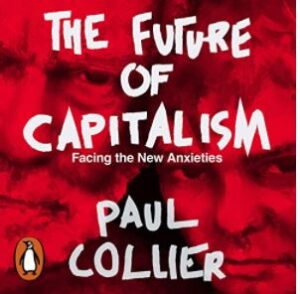 In the Future of Capitalism, Paul Collier makes a practical attempt to move economic theory forward from nineteenth century views of humans only being driven by self-interest and greed. The neo-liberal ideas, that this distortion spawned, are to blame for the 2008 financial crash and the huge divisions in society that exist today; the UK is a nation divided between an affluent, educated city-based elite and disaffected town -dwellers left behind by the effects of globalisation.
In the Future of Capitalism, Paul Collier makes a practical attempt to move economic theory forward from nineteenth century views of humans only being driven by self-interest and greed. The neo-liberal ideas, that this distortion spawned, are to blame for the 2008 financial crash and the huge divisions in society that exist today; the UK is a nation divided between an affluent, educated city-based elite and disaffected town -dwellers left behind by the effects of globalisation.
A key to his thesis is to recognise that belonging to a community is vital to man’s sense of identity. Most people gain their sense of identity from their family, their job and their nationality. The educated elite take pride in their profession, travel widely and place less emphasis on nationality. For the less-educated the situation is different. The rise of one-parent families, insecure jobs, Covid and many other issues has put immense strain on family life. Jobs for the skilled working class in manufacturing have disappeared as a result of globalisation and have been replaced by low-skilled precarious work in services and logistics. With both pride in the job disappearing and the pressures on family life, nationhood has come to be even more important in defining the identity of the less-well off.
This division became clear in the Brexit vote, which represented a failure of the radical left to engage and understand the disadvantaged. As Paul Collier says:
By eschewing shared belonging, and the benign patriotism that it can support, liberals have abandoned the only force capable of uniting societies behind remedies. Inadvertently, recklessly, they have handed it to the charlatan extremes, which are gleefully twisting it to their own warped purposes.
The election of Trump in the USA and the collapse of the red wall in the UK have been the result.
Paul Collier advocates that supporting communities needs to become central to economic thinking. He has developed ideas that support young disadvantaged families, that refocus businesses on developing a stable and skilled workforce, and that build and support local communities.
It is a good start, but only when economists fully understand that it is community development and memetic evolution that drives society forward will a more complete set of beneficial policies emerge.
